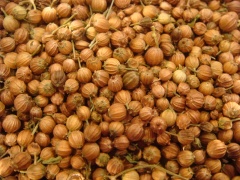Coriander Seed
| Infobox on Coriander Seed | |
|---|---|
| Example of Coriander Seed |  |
| Facts | |
| Origin | See text |
| Stowage factor (in m3/t) | 3,54 m3/t |
| Humidity / moisture | See text |
| Ventilation | - |
| Risk factors | See text |
Coriander Seed
Description
Coriander (Coriandrum sativum), also known as cilantro, Chinese parsley or dhania, is an annual herb in the family Apiaceae. Coriander is native to regions spanning from southern Europe and North Africa to southwestern Asia. It is a soft, hairless plant growing to 50 cm (20 in) tall. The leaves are variable in shape, broadly lobed at the base of the plant, and slender and feathery higher on the flowering stems. The flowers are borne in small umbels, white or very pale pink, asymmetrical, with the petals pointing away from the centre of the umbel longer (5–6 mm) than those pointing towards it (only 1–3 mm long). The fruit is a globular, dry schizocarp 3–5 mm (0.12–0.20 in) in diameter.
The dry fruits are known as coriander or coriandi seeds. The word "coriander" in food preparation may refer solely to these seeds (as a spice), rather than to the plant. The seeds have a lemony citrus flavour when crushed, due to terpenes linalool and pinene. It is described as warm, nutty, spicy, and orange-flavoured.
The variety C. s. vulgare has a fruit diameter of 3–5 mm, while var. microcarpum fruits have a diameter of 1.5–3 mm. Large-fruited types are grown mainly by tropical and subtropical countries, e.g. Morocco, India and Australia, and contain a low volatile oil content (0.1-0.4%). They are used extensively for grinding and blending purposes in the spice trade. Types with smaller fruit are produced in temperate regions and usually have a volatile oil content of around 0.4-1.8%, so are highly valued as a raw material for the preparation of essential oil.
It is commonly found both as whole dried seeds and in ground form. Seeds can be roasted or heated on a dry pan briefly before grinding to enhance and alter the aroma. Ground coriander seed loses flavour quickly in storage and is best ground fresh.
Application
All parts of the plant are edible, but the fresh leaves and the dried seeds are the parts most traditionally used in cooking. Coriander is common in South Asian, Middle Eastern, Central Asian, Mediterranean, Indian, Tex-Mex, Latin American, Portuguese, Chinese, African, and Scandinavian cuisine.
Coriander seed is a spice in garam masala and Indian curries, which often employ the ground fruits in generous amounts together with cumin. It acts as a thickener. Roasted coriander seeds are eaten as a snack. It is the main ingredient of the two south Indian dishes: sambhar and rasam. Coriander seeds are boiled with water and drunk as indigenous medicine for colds.
Shipment / Storage / Risk factors
Coriander seed is usually shipped in bags. Should be stowed away from delicate goods. The main causes of damage to seeds are contact with water, heating, fermentation and sprouting, spontaneous heating, and infestation. Seeds are liable to absorb moisture from the atmosphere and in consequence develop mould. Seeds which have become damp, wet or heated should be immediately dried. Exposure to the sun may kill the life of some seeds. The sound seeds should be separated from the damaged if this is an economic proposition. Damaged seeds should be disposed of as soon as is possible. Seeds are liable to heat and deteriorate if not properly dried before shipment. Deterioration may also set in if seeds are kept for any length of time in conditions of excessive heat. Loss in weight may be due to loss of moisture content, heating, infestation or seepage. Seeds from some countries may contain a percentage of fine dust or sand which can be partly lost in transit. Infestation may be caused by insects inherent in the seeds before shipment. See also individual commodity headings and Oil Seeds.











